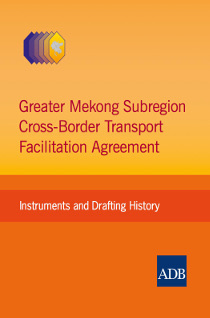
Cross-Border Transport Facilitation Agreement
The Cross-Border Transport Facilitation Agreement (CBTA) is a flagship initiative under the Greater Mekong Subregion Economic Cooperation Program to promote transport and trade facilitation.
Countries of the Greater Mekong Subregion are working to make the movement of goods and services across borders faster, easier, cheaper, more compliant, and more inclusive.
Over the past decade, the Greater Mekong Subregion’s (GMS) road network has expanded by almost 200,000 kilometers, and overland road freight has almost doubled. Yet despite these advances, remaining barriers to trade and transport continue to inhibit the subregion’s full economic potential and the cost of cross-border land transport remains high.
With much of the hard infrastructure in place, there has been a greater focus in recent years on the rules, regulations, agreements, and other “software” to make the movement of goods and services across borders in the GMS faster, easier, cheaper, more compliant, and more inclusive.
The GMS Economic Cooperation Program Strategic Framework 2030 (GMS-2030) focus on trade facilitation will modernize customs and establish sanitary and phytosanitary regulations. It will also strengthen links to the private sector. GMS-2030 will support the development of e-commerce platforms in the subregion. By facilitating investment, the strategy will ease or eliminate investment flow constraints and create an integrated investment market. GMS-2030 was endorsed and adopted at the 7th GMS Summit of Leaders in September 2021. It aims to provide a new setting for the development of this subregion for the next decade.
The GMS Transport and Trade Facilitation Action Program is working to overcome existing barriers in order to link the subregion to the ASEAN Economic Community’s single market and production base, as well as other regional cooperation initiatives.
The program is helping to expand transport and traffic rights along the GMS Cross Border Transport Facilitation Agreement (CBTA). route network; simplify and modernize customs procedures and border management; and strengthen the capacity of sanitary and phytosanitary agencies in the subregion.
To facilitate progressive implementation of the CBTA, the GMS Transport Ministers as members of the CBTA Joint Committee agreed to an “Early Harvest” memorandum of understanding to allow the issuance and mutual recognition of GMS Road Transport Permits along the CBTA Protocol 1 route network and the border crossing points along these routes starting August 2018. This initiative was suspended with the closure of international borders during the Covid-19 health pandemic, but reinstated by the Ministers for a further three-year period at the Eighth CBTA Joint Committee meeting in December 2023.
Related
• ‘Early Harvest’ Implementation of the Cross-Border Transport Facilitation Agreement
• Joint Committee for the CBTA
• Statement of the Seventh Meeting of the Joint Committee for the CBTA (13 March 2019)
Focal Persons at the Asian Development Bank
Asadullah Sumbal
Regional Cooperation and Integration Unit Southeast Asia Department
Dorothea Lazaro
Regional Cooperation and Integration Unit
Central and West Asia Department
Mohammad Nazrul Islam
Transport Sector Office
Sectors Group
Other Concerned Staff & Consultants
Antonio Ressano
Regional Cooperation and Integration Unit
Southeast Asia Department
Lucia Martin Casanueva
Regional Cooperation and Integration Unit
Southeast Asia Department/GMS Secretariat
Send inquiries to GMS Secretariat.

The Cross-Border Transport Facilitation Agreement (CBTA) is a flagship initiative under the Greater Mekong Subregion Economic Cooperation Program to promote transport and trade facilitation.

This is the statement issued by the Joint Committee for the Cross-Border Transport Facilitation Agreement in Vientiane, Lao People’s Democratic Republic on 17 June 2010.
MANILA, PHILIPPINES (8 December 2010) - A $5.7 million technical assistance grant from ADB will help to improve transport and trade facilitation between countries in the Greater Mekong Subregion.
MANILA, PHILIPPINES (29 November 2010) - The Asian Development Bank will extend $95 million to help the Lao People's Democratic Republic and Viet Nam upgrade roads in the northeastern transport corridor that offers trade and poverty reduction benefits to both countries, as well as the wider Mekong region.

This report reviews and updates the Pre-Investment Study for EWEC conducted in 2001. It consolidates the interests and concerns of stakeholders into a revised and updated strategy and action plan.
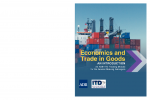
This training material aims to strengthen officials' and experts' understanding of the trade barriers that affect trade in goods and the economic determinants of such trade; proposals made in different forums to reform border policies affecting trade in goods and the analysis of those proposals, with a particular focus on the strategic questions raised by regional trade agreements; and particular challenges facing trade policy makers in the Greater Mekong Subregion.
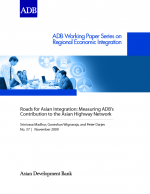
Against the backdrop of growing momentum for regional cooperation and integration (RCI) in Asia, this paper examines the link between regional roads and Asian Development Bank (ADB) support between 1966 and 2008.
The novel methodology used in this paper includes an Asia-wide definition of regional roads that fall on the Asian Highway (AH) network. The AH network is a system of about 140,000 kilometers (km) of standardized roads crisscrossing many Asian countries and with linkages to Europe.
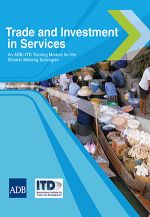
Services account for a significant share of the subregion’s GDP, ranging from 25.7% in the Lao People's Democratic Republic to 39.1% in Cambodia and 46.0% in Thailand

Flagship study that analyzes major challenges in developing regional infrastructure, particularly transport and energy through regional cooperation towards a seamless Asia.
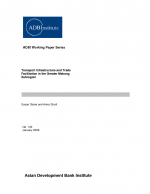
As trade is an important driver of growth and infrastructure is a necessity for trade, infrastructure development has a key role to play in economic development. This study aims to quantify the potential benefits of the development of the economic transport corridors, along with the implementation of the Cross-Border Transport Agreement (CBTA) in the Greater Mekong Subregion (GMS). Some of the key linkages between upgraded infrastructure, economic growth, and sectoral responses are explored using a computable general equilibrium (CGE) framework.